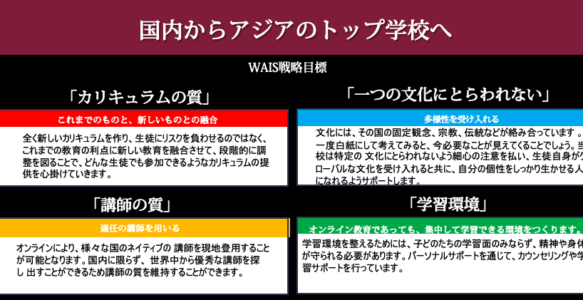Basic Philosophy

Today, we live in an age of constant change. Not only the waves of global society, declining birth rates, national economy fluctuations, and infectious diseases, such as covid-19, are piling up. With little prospect for the future, education is necessary and should not be taken for granted. In addition, the stereotypes, religions, and traditions of a country’s culture, which have been cultivated over many years, may intertwine and affect education.
WAIS has adopted educational methods that are in line with the current times. We also respect each other’s culture so that students from any cultural background can feel at ease. In this way, students can easily adopt new values and ways of thinking and learn to be self-reliant in the global society of the future.
WAIS places particular emphasis on three aspects: the quality of curriculum and materials, the quality of teachers, and the provision of a learning environment.
The Quality of Curriculum and Materials approved by the United States

WAIS recognizes the importance of using a nationally approved curriculum and materials.
How would you feel if the school you are currently attending in Japan teaches with its own curriculum and commercial materials? Of course, there would be educational disparities depending on the school. In Japan, most public schools are granted to use government-approved curriculums and materials to minimize nationwide educational inequality.
Partnering with two accredited schools in the United States enables us to provide students with the curriculum and materials (digitally) that are approved by the US Department of Education. This eliminates the educational gap between students studying in the US and WAIS students.
WAIS believes that using US government-approved curriculum and materials is more beneficial for many students.
Teacher Quality Online -we can recruit teachers from all over the world.

Just as not every Japanese person can become a Japanese language teacher, not every person can become an English teacher just because they are a native speaker. However, since the number of native English speakers in Japan is quite limited, it hasn’t been easy to find native English-speaking teachers.
Online resources enable us to meet with qualified native English-speaking instructors located worldwide. Also, applying our Japanese staff supporting those instructors allows us to provide the students with the best-qualified education that is comfortable for Japanese students.
A mobile-friendly environment for all students

Japanese people are rated as the least able to speak English among developed countries. There are many environments where you can learn English, but not many environments where you can understand English without swiftly translating it into Japanese. In other words, it is quite difficult to find a learning opportunity where you can develop a native English speaker’s mindset.
Speaking Japanese ability is enough to have a comfortable life in Japan, and this situation enables us to feel that high English competency is not required. Most Japanese settle with an English-speaking level just for traveling abroad on vacation. However, it is quite evident that this English competency is not enough to be a global leader leading in the 21st century.
A global society requires us to have the ability to listen, understand, persuade, argue, and reach others in English. To achieve this, we have to learn all our expertise from basic to advanced level in English. The experience of learning, thinking, worrying, discovering, and being moved in English will help people to acquire the skills that will enable them to convey their feelings to others. We believe that the students will be able to move others with their own English words just by experiencing these feelings with learning, considering, struggling, discovering, and thrilling in English-speaking situations.
English competency skills, which can help persuade others, are entirely different from conversational English competency skills, which are essential for a global society in the 21st century. However, it is not an easy job to develop English competency skills in Japan as it requires a lot of time to devote your time to study English. According to the Foreign Service Institute of the US Department of Foreign Affairs, it takes 2200 hours for Americans to learn Japanese to achieve native Japanese language competency. (Foreign Language Training – United States Department of State)
Let us imagine that if you study English for one hour every week, it will take you about 46 years to learn 2200 hours. If you start studying at the age of 6, you wouldn’t reach competency until turning 52! If they charge you 10,000 yen for the monthly lessons, the total cost would be about 5,520,000 yen!
Let’s consider if your child enrolls in an international school in Japan. The average annual tuition is said to be around 1.5 to 2 million yen. This means the total cost would be 18 to 24 million yen if they were enrolled in an international school for 12 years (elementary, middle, and high school). In addition, international schools are not located in every corner of the country, so there are often no schools within easy reach.
WAIS will provide an environment where more people can learn English no matter where they live and their family finances. We can realize this by providing an online educational system that saves on the cost of physical classroom maintenance.
Since we agree with the advantages of the face-to-face learning environment in a classroom, we also consider providing these educational classroom environments in the future. We commit to being very flexible in decision-making as the world is changing dramatically every day. We also believe that we can gradually improve the educational environment to match the future. Based on the existing educational system, WAIS will be one of the international schools by integrating our curriculum with the current educational institutions in Japan and abroad.
8 global skills you can acquire through WAIS

- English Ability
- Flexibility
- Communication Skills
- Challenging Spirit
- Sense of Responsibility
- Ability to Embrace Diversity & Inclusion
- Logical Thinking
- Presentation Skills

